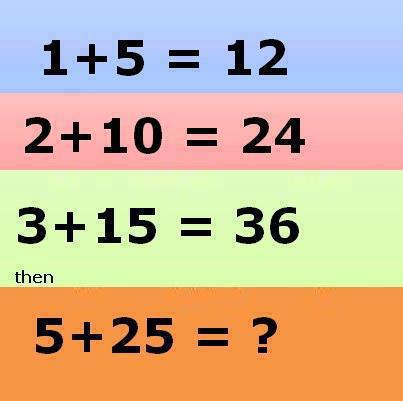Human behaviour can be strange and fascinating. That is why I decided, back in high school, to pursue a career in psychology: because I was fascinated by human behaviour. (Yes, I told people it was because I wanted to find out what was wrong with me, and fix it. But I lied.)
I’d like to take you on a little journey into the fascinating world of human behaviour. As a starting point, perhaps you could solve the following little mathematical problem for me. Please humour me and don’t google it … yet. But you can use a calculator if you like:
Please write your answer down, or at least remember it, before reading on.
This puzzle has no doubt appeared in many places in the great big world of the internet. I happened across it after the post of some radio station went viral on facebook (the above image of the puzzle links to the original post by the radio station, with all 300,000+ comments). It was accompanied by the text:
(Susan) Saw this online and it ticked me off that I got it wrong. The headline said 92% of us will get the answer wrong. Put your answer (AND NOTHING ELSE!!!!) into the comment section and I will explain the answer tomorrow morning at 6am.
There followed a storm of comments (mostly just people’s answers, as instructed). Several days after this was posted and the answer given on radio and over, and over, and over, and over again on the station’s facebook page, people’s reactions continue to get posted, in all sorts of random places, and tempers are flaring.
I took the last 1,000 comments (all posted well after the “correct” answer was provided) and of those 1,000 just 42 (4%) – got the “correct” answer. The other 96% of people – even more than predicted – are “wrong”.
708 (71%) of the other answers were 60. 154 (15%) answered 48. 8 (1%) answered 72. Some people gave multiple answers, so that leaves somewhere over 9% of people who gave some other answer, including answers such as:
what is this sorcery, how are any of these correct?? im so lost!
The “correct” answer was 30. The reasoning, of course, is that 5+25 does equal 30, and the preceding pieces of information were just there to confuse you. Put more elaborately, the claim is that there was no “if” before the initial three “equations” so the “then” is not part of a valid logical question and the sum should be calculated as a normal mathematical problem. To which 4% of people would reply, “I told you so”, and most of the rest of us would retort, “nonsense!” (Excluding a handful who might say, “Wow! That’s so clever!” and proceed to try it on their friends.)
So why am I writing about this? Like I said, it demonstrates something interesting about human behaviour. Let’s go a little deeper in our journey.
Writes one commenter:
Regarding the answer to the math question, I came up with 60 by multiplying the first number by 7. My husband came up with this answer and explanation:
Try changing the paradigm, most folks, myself included. have rushed to add some “new factor” to the equation of assumed result. Try this in a different “ruling system”. This allows us to keep the given equations intact and come up with the answer of 72. That is to say, the left side is expressed in base 10. On the other side of the equals sign (=) the result is expressed in base 4. 72 in base four (seven fours and two ones) equals 30 (25+5=30) (three tens, no ones) in base 10 Try it, it works for all written equations.
And then there are those who are angry at being tricked:
seriously… the word “then” implies the conditional “if”. Those of us who were “wrong” would be just as wrong if we said 3 and 5 makes 8 instead of 35 because the questioner didn’t use the operative “plus”. The point is that the questioner was acting in bad faith by asking a question that provides a condition that is then removed by a dubious technicality.
…and…
Giving a deliberately misleading pattern and saying we are wrong for following it isn’t proof we are trying to be overly clever. It means the person who made the “test” is trying to be overly clever and calling others out for his or her own behavior.
…and…
Implied “if”. If the question is posed as “which of the following are correct”, I can see this explanation. However, the first three equations in the pattern are “givens”…So “that, that, and that are true, then….this”.
If this were a problem on a test, and I were marked wrong for “60”, I would challenge the question because it would be grammatically incorrect to have “then” before the last step in the pattern…”and” would be a correct way to pose the problem.
The test writer needs to be smart enough to write questions so that they cannot be overanalyzed…so that there is only one correct answer. However, because this question can be interpreted as having an implied “if”, both 30 and 60 could be correct, given the possibility of having a math instructor who is lacking in English skills.
These were joined by my favourite:
Saw your “math” problem, the mensa IQ brain of mine figured it this way. 1+5=12, (so 5=5 and 1=7), next line 2+10=24, (because we have established that 1=7, 2=14+10=24), next line 3+15=36 (because we have established that 1=7,2=14, now 3=21+15=36, next line 5+25=? (because we have established that 5=5, back in the first problem, and the second number has been it’s true value in each problem) THEN 5+25=30 This my friends is the correct answer and it is not a “psychological riddle” or a “trick” it is just so far above the average brain it must be explained to you.
… which successfully enraged several people, which I’m sure was precisely the intent of that poster.
I am particularly interested in two implications of the furor over this simple puzzle:
- When presented with incomplete or ambiguous information, different people apply different rules to fill in the gaps and resolve ambiguity;
- ambiguous communication has potentially significant emotional consequences.
When you add to those observations the recognition that our daily communication is absolutely filled with ambiguity, it is good reason for us to reflect on those times when we experience a strong emotional reaction to our interactions with another person. We don’t get to choose how other people react to us, but we can temper our reactions to others. How many times have you witnessed a conflict between two people that came down to nothing more than a small misunderstanding? How many times have you been in a conflict that was caused by a misunderstanding on the other person’s part? How many times have you been in a conflict that was caused by a misunderstanding on your part?
There is no solution to the fact that people misinterpret and misunderstand things. There is no solution to the fact that we communicate ambiguously a lot of the time. You can take steps to improve your communication skills so misunderstanding is less frequent … but you can’t eliminate the problem altogether (you might be interested to read one of our earlier articles, “It’s not me – it’s you” – a problem of perspective, which outlines a strategy for dealing with ongoing interpersonal conflict).
There is a place for introducing some flexibility to your interpretation of situations. It is useful to be able to think over that insulting interaction you had with a colleague and think, “Maybe she was implying that she thinks I am stupid … but it is also possible she didn’t mean it that way at all.” It is useful to be able to sit with that uncertainty, and not need a definite answer – just like it is useful to be able to look at the mathematical problem above and recognise that 30, 48, 60, 72 and probably multiple other answers could be valid depending on the assumed parameters. It is a stupid question. And there is no right answer. And that’s okay.
Remember your initial answer? I would love you to post it with your comments on how you arrived at it. I would be interested to see if the context of this post, with the title effectively offering a warning about the question, changes the frequency of different responses people give.


Leave a Reply